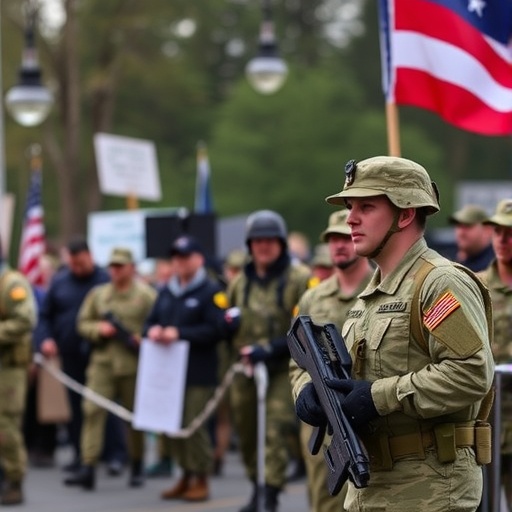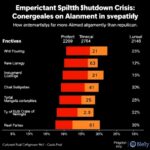Federal Appeals Court Overturns Block on Trump’s National Guard Deployment in Oregon Protests
In a stunning reversal that escalates the federal response to ongoing unrest in Portland, a federal appeals court on Tuesday ruled to allow President Donald Trump’s deployment of National Guard units in Oregon. The decision overturns a lower court’s injunction, which had deemed the Trump Administration’s assertions of widespread violence as unfounded, paving the way for up to 2,000 troops to assist local law enforcement amid months of protests against police brutality.
The ruling, issued by a three-judge panel at the Ninth Circuit Court of Appeals, comes at a critical juncture as demonstrations in Oregon’s largest city enter their fourth month. Protesters, galvanized by the death of George Floyd and local incidents of police misconduct, have clashed repeatedly with authorities, leading to property damage, injuries, and arrests. The Trump Administration had argued that the situation warranted federal intervention to protect federal property and ensure public safety, a claim now bolstered by the appeals court’s 2-1 decision.
This development marks a significant victory for the administration, which has faced criticism for its aggressive tactics in quelling protests nationwide. Legal experts suggest the ruling could set a precedent for similar deployments in other hotspots, intensifying debates over federal overreach versus states’ rights.
Appeals Court Panel Cites Insufficient Evidence in Lower Ruling
The Ninth Circuit’s decision hinged on what the judges described as ‘manifest errors’ in U.S. District Judge Michael Simon’s earlier order blocking the National Guard deployment. In a 28-page opinion, the panel argued that the lower court had overstepped by dismissing the Trump Administration’s evidence of escalating threats to federal buildings in Portland, including the Mark O. Hatfield Federal Courthouse.
‘The district court’s findings do not align with the factual record presented, which includes documented instances of arson, vandalism, and assaults on federal officers,’ wrote Judge Milan D. Smith Jr. in the majority opinion. The court referenced specific incidents from July and August 2020, where protesters allegedly used commercial fireworks as projectiles and set fires near federal facilities, injuring at least 100 federal agents according to Department of Homeland Security reports.
Statistics underscore the tension: Portland police data shows over 1,000 arrests since late May, with more than 100 federal charges filed for crimes ranging from rioting to assault. The appeals court emphasized that while peaceful protests are protected under the First Amendment, the deployment addresses ‘unlawful activities’ that local forces cannot contain alone. This ruling effectively reinstates Acting Homeland Security Secretary Chad Wolf’s authorization for the Oregon Deployment, which was initially announced on July 30, 2020.
Civil liberties advocates, however, decried the decision. ACLU attorney Emmeline Brennan stated, ‘This is a dangerous escalation that prioritizes optics over constitutional rights. The Trump Administration’s narrative of chaos doesn’t match the reality of mostly peaceful assemblies.’
Trump Administration’s Escalating Strategy in Portland Unrest
The push for National Guard involvement stems from the Trump Administration’s broader strategy to project strength amid the 2020 election cycle. Since early June, federal agents from agencies like Customs and Border Protection and the Border Patrol Tactical Unit have been deployed to Portland without state consent, a move Oregon Governor Kate Brown called ‘inflammatory.’
White House Press Secretary Kayleigh McEnany defended the policy during a briefing, saying, ‘Portland has become a symbol of lawlessness under Democratic leadership. The National Guard will restore order and protect American lives and property.’ The administration cited a Department of Justice report estimating $2.5 million in damages to federal property in Oregon alone, including broken windows, graffiti, and structural fires.
Historically, National Guard deployments in civilian contexts have been rare and controversial. Under the Insurrection Act of 1807, presidents can federalize state guards without gubernatorial approval in cases of rebellion or obstruction of law. Trump invoked a similar authority in 2020 for deployments in Washington, D.C., following George Floyd protests, deploying 5,100 troops. In Oregon, the plan involves California and Arizona National Guard units, as Oregon’s governor refused to activate her state’s forces.
Critics point to the administration’s rhetoric as politically motivated. A New York Times analysis revealed that federal interventions spiked in Democratic-led cities, with Portland’s nightly protests—drawing 1,000 to 2,000 participants—serving as a flashpoint. Local business owners, however, have mixed views; a survey by the Portland Business Alliance found 62% support federal aid to curb vandalism that has shuttered downtown shops.
Oregon Leaders Vow Resistance to Federal Troops Arrival
Governor Kate Brown reacted swiftly to the appeals court’s ruling, announcing plans to challenge it further at the Supreme Court. ‘This is an assault on state sovereignty,’ Brown said in a televised address. ‘Oregon will not stand by while the Trump Administration turns our streets into a militarized zone.’ She highlighted that state troopers and local police have managed 95% of protest-related incidents without federal help, per Oregon State Police logs.
Portland Mayor Ted Wheeler echoed these sentiments, warning that National Guard presence could ‘exacerbate tensions and lead to more violence.’ Wheeler referenced a July 2020 incident where federal agents’ use of tear gas and rubber bullets drew widespread condemnation, including from UN human rights observers who called it ‘excessive force.’
On the federal side, Oregon’s Republican Senator Jeff Merkley, a Democrat, urged de-escalation, tweeting, ‘Federal overreach won’t solve Portland’s problems—it will inflame them.’ Meanwhile, Trump supporters rallied outside the federal courthouse, chanting ‘Law and order!’ A poll by The Oregonian showed 48% of residents oppose the deployment, 35% support it, and 17% are undecided, reflecting deep divisions.
Community leaders from Black Lives Matter Portland emphasized the human cost. Organizer Teressa Raiford noted, ‘These troops aren’t here for us—they’re here to suppress our voices. We’ve seen 200 injuries from less-lethal munitions; adding the Guard will only worsen that.’ Quotes from affected residents paint a vivid picture: Maria Gonzalez, a bookstore owner, said, ‘My windows are shattered twice a month. I want peace, but not at the cost of our freedoms.’
Legal Precedents and Broader Implications for Federal Power
The appeals court’s decision draws on precedents like the 1992 Los Angeles riots, where National Guard troops quelled unrest after California’s governor requested aid. Unlike that case, Oregon’s resistance highlights tensions under the Posse Comitatus Act, which limits military involvement in domestic law enforcement unless authorized by Congress or the president.
Legal scholars like Georgetown’s Rosa Brooks argue this ruling expands executive authority. ‘It’s a slippery slope,’ Brooks said in an interview. ‘If unchallenged, it could normalize military deployments in any protest scenario deemed threatening.’ The Trump Administration has defended its actions under Title 10 of the U.S. Code, allowing guard units to support federal missions.
Statistics from the Armed Conflict Location & Event Data Project indicate U.S. protests in 2020 are the largest since the Civil Rights era, with over 10,500 demonstrations and fewer than 570 involving violence. This context questions the necessity of the Oregon Deployment, yet the court focused on federal property protection, citing 18 U.S.C. § 1361 on willful injury to government assets.
Internationally, the move has drawn scrutiny; Amnesty International labeled it ‘a threat to free assembly,’ comparing it to authoritarian crackdowns. Domestically, it fuels partisan divides, with House Democrats introducing legislation to curb presidential deployment powers.
As the National Guard mobilizes, anticipated arrival within 72 hours could transform Portland’s landscape. Watch for potential clashes, legal appeals, and political fallout as the November election looms. The ruling not only reinforces the Trump Administration’s hardline stance but also signals a potential shift in how federal forces engage with civil unrest, leaving Oregon at the epicenter of this evolving national debate.








